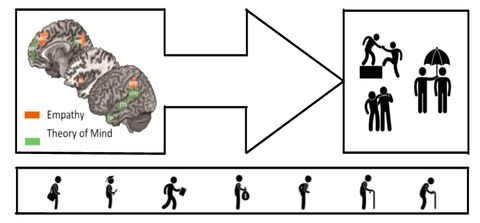Social Interaction and Decision-Making during adult Development [SID-Life]
Delineating cognitive and affective neural correlates of social decision-making processes during adult development (funded by DFG)
Theoretical Background
Throughout life humans are faced with situations that require social decision-making, which are important for social interactions in everyday life. However, there seem to be large interindividual differences as well as intraindividual variations in such decision-making processes across the lifespan. While this topic has been intensely investigated throughout childhood, we know considerably less about how it may change across adulthood and in old age.
Research over the last two decades has demonstrated that different social affective and cognitive processes are involved in social decision-making processes. On the affective side, empathy and compassion can be dissociated. The cognitive route has been investigated with respect to mentalizing (also known as Theory of Mind). Indicators of these capacities have been shown to be associated with decision-making parameters and the corresponding neural activation patterns as predictors.
Research on adult development of social decision-making processes has yielded mixed results. In some studies, older adults tend to make more socially oriented decisions, while this is less apparent in other studies. Moreover, it has been shown that social decision-making is supported by social affective processes such as empathy and reasoning abilities.
Whereas elementary cognitive functions and their underlying neurocognitive mechanisms decline substantially during adult development, social affective functions, in contrast, seem to be less influenced by aging, with no alterations or even improved functions. The divergent adult developmental trajectories of cognitive and social-emotional functions parallel in part findings of differential brain aging: areas critical for affective processing maintain their structural integrity (e.g., cortical thickness), whereas regions implicating cognitive executive functions show more pronounced aging-related decline.
Project Aims
By combining fMRI experiments with computational modeling, the project aims to answer three sets of research questions:
1. Social affect and cognition
What are age-related differences in social affect and cognition across the adult lifespan? In particular, what are the structural and functional brain correlates for the divergent age-related differences in socio-cognitive and socio-affective facets of social understanding?
2. Social decision-making
What are age-related differences in the social decision-making process across the adult lifespan? What are the neural correlates of these differences?
3. Predicting age-related differences in social decision-making
Could age differences in brain correlates of the affective and cognitive facets of social mind account for adult development of social decision making?
Principle Investigators and Team
- Dr. Andrea Reiter
- Prof. Shu-Chen Li, Ph.D
- M.Sc. Lena Pollerhoff
Collaborators
Selected Project-relevant Publications
Pollerhoff, L., Stietz, J., Depow, G. J., Inzlicht, M., Kanske, P., Li, S.-C., & Reiter, A. M. F. (2021). Investigating adult age differences in real-life empathy, prosociality, and well-being using experience sampling. PsyArXiv. https://doi.org/10.31234/osf.io/983ey
Reiter, A. M. F., Diaconescu, A. O., Eppinger, B., & Li, S. C. (2021). Human aging alters social inference about others’ changing intentions. Neurobiology of Aging, 103, 98-108. https://doi.org/10.1016/j.neurobiolaging.2021.01.034
Röbbig, J., Erbey, M., Babayan, A., Reiter, A. M. F., Kumral, D., Schaare, H. L., Reinelt, J. D., ..., & Villringer, A. (2021). Anger regulation choice - The role of age and habitual reappraisal. Emotion. Advance online publication. https://doi.org/10.1037/emo0000915
Stietz, J., Pollerhoff, L., Kurtz, M., Li, S.-C., Reiter, A. M. F., & Kanske, P. (2021). The ageing of the social mind: Replicating the preservation of socio-affective and the decline of socio-cognitive processes in old age. R. Soc. Open Sci. 8: 210641. https://doi.org/10.1098/rsos.210641
Erbey, M., Röbbig, J., Babayan, A., Kumral, D., Reinelt, J., Reiter, A. M. F., ..., & Villringer, A. (2020). Positivity in younger and in older age: Associations with future time perspective and socioemotional functioning. Frontiers in Psychology, 11. https://doi.org/10.3389/fpsyg.2020.567133
Reiter, A. M. F., Suzuki, S., O’Doherty, J. P., Li, S.-C., & Eppinger, B. (2019). Risk contagion by peers affects learning and decision-making in adolescents. Journal of Experimental Psychology: General, 148(9), 1494–1504. https://doi.org/10.1037/xge0000512
Rodriguez Buritica, J. M., Heekeren, H. R., Li, S.-C., & Eppinger, B. (2018). Developmental differences in the neural dynamics of observational learning. Neuropsychologia, 119, 12–23. https://doi.org/10.1016/j.neuropsychologia.2018.07.022
Reiter, A. M. F., Kanske, P., Eppinger, B., & Li, S.-C. (2017). The aging of the social mind - differential effects on components of social understanding. Scientific Reports, 7(1), 11046. https://doi.org/10.1038/s41598-017-10669-4

